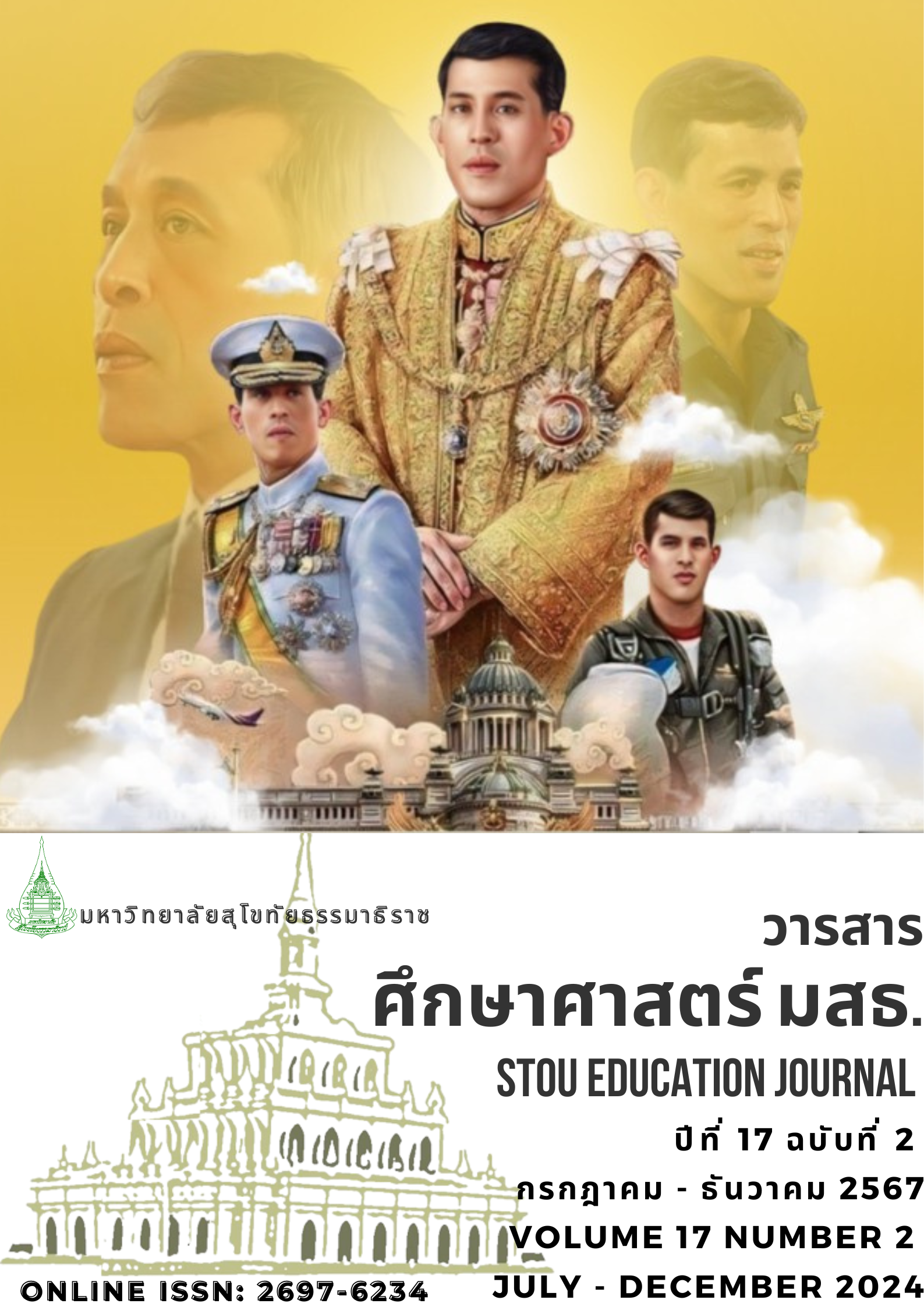The Development of the Short Training Course to Develop Thai Integrated Instruction Competence with Local Identity for the Student Teachers in the Thai Language Program
Main Article Content
Abstract
The objectives of this study were to develop and evaluate the training course to develop Thai integrated instruction competence with local identity for the student teachers in the Thai language program. The methods of the research were conducted under a research and development. The data collection and analysis using mixed methods. The sample group is bachelor of education program students from the Thai language program, Faculty of Education, Nakhon Si Thammarat Rajabhat University, teaching practice in an educational institution, semester 1, academic year 2023, totaling 28 people by cluster random sampling, using universities as the sampling unit. The research tools consisted of the training course and the training course document. The tools used to evaluate the effectiveness of the training course are a competency assessment form, a classroom observations form, and a self-reflection assessment. The qualitative data were synthesized by using content analysis; while the quantitative data were statistically analyzed using the mean, standard deviation, and t-test. The research results were as follows: 1) the training course consisted of five components: (1) curriculum principles and concepts, (2) learning development expectations, (3) training activities, (4) hybrid technology and media, and (5) evaluation and improvement. The training activity is divided into three learning units: analysis of learning context and local identity, integrating creative learning, and professional learning management practices. 2) The effectiveness of the training course, it was found that student teachers in the Thai language program had Thai integrated instruction competence with local identity after using the training course, it was higher than before using the training course at a statistical significance level of .05.
Article Details
References
คณะกรรมการมาตรฐานการอุดมศึกษา. (2565). ประกาศคณะกรรมการมาตรฐานการอุดมศึกษา เรื่อง เกณฑ์มาตรฐานหลักสูตรระดับปริญญาตรี พ.ศ. 2565. https://www.ops.go.th/
คณะครุศาสตร์ มหาวิทยาลัยราชภัฏนครศรีธรรมราช. (2565). เอกสารประกอบโครงการอบรมการพัฒนาระบบการผลิตครูสู่ความเป็นเลิศ. มหาวิทยาลัยราชภัฏนครศรีธรรมราช.
คุรุสภา. (2562). ข้อบังคับคุรุสภา ว่าด้วยมาตรฐานวิชาชีพ (ฉบับที่ 4) พ.ศ. 2562. https://www.ksp.or.th/laws/
จุฬารัตน์ ธรรมประทีป. (2566). การพัฒนาสมรรถนะการออกแบบการเรียนรู้ฐานสมรรถนะของครูวิทยาศาสตร์โดยใช้กระบวนการเรียนรู้แบบนำตนเอง. วารสารศึกษาศาสตร์ มสธ., 16(2), 123-140.
ชวน เพชรแก้ว. (2558). สืบโยดสาวย่าน งานวิจัยวัฒนธรรมภาคใต้ หนังสือชุดการประเมินและสังเคราะห์สถานภาพองค์ความรู้จากการวิจัยวัฒนธรรม. มหาวิทยาลัยเชียงใหม่.
ฐิติพร ไขแสง, จักรกฤษณ์ จันทะคุณ และวิเชียร ธำรงโสตถิสกุล. (2566). การพัฒนาหลักสูตรฝึกอบรม เพื่อเสริมสร้างความสามารถในการจัดการเรียนรู้ภาษาไทยตามทฤษฎีเชื่อมโอนภาษาสำหรับครูที่สอน นักเรียนกลุ่มชาติพันธุ์. วารสารวิชาการและวิจัยสังคมศาสตร์, 18(2), 169-184.
ทิศนา แขมมณี. (2565). ความมีอิสระในการใช้หลักสูตรและการปรับหลักสูตร (ไฟล์เสียงและเอกสารประกอบ)แนวทางการพัฒนาหลักสูตรสถานศึกษาของสถานศึกษานำร่องในพื้นที่นวัตกรรมการศึกษา.
ประชา สุวีรานนท์. (2558). อัตลักษณ์ไทย: จากไทยสู่ไทย ๆ. ฟ้าเดียวกัน.
มาเรียม นิลพันธุ์. (2558). วิธีวิจัยทางการศึกษา. มหาวิทยาลัยศิลปากร.
วรรณดี สุทธินรากร, ภูวเรศ อับดุลสตา และสมเกียรติ สุทธินรากร. (2564). การพัฒนาหลักสูตรฐานสมรรถนะและการจัดการเรียนรู้อย่างมีความหมาย. สยามปริทัศน์.
วัชราภรณ์ จันทนุกูล. (2561). มรดกทางภูมิปัญญา: อัตลักษณ์ร่วมทางสังคมและวัฒนธรรมของอาเซียนภาคพื้นไทย ลาว และกัมพูชา. วารสารสันติศึกษาปริทรรศน์ มจร, 6(3), 953-969.
วิชัย วงษ์ใหญ่ และ มารุต พัฒผล. (2563). การเรียนรู้เชิงสร้างสรรค์ (Creative Learning). จรัลสนิทวงศ์การพิมพ์.
สรินฏา ปุติ, วรรณนะ หนูหมื่น และวิฑูรย์ เมตตาจิตร. (2561). การวิเคราะห์การสื่อถึงวัฒนธรรม ชุมชน 3 จังหวัดชายแดนใต้จากแบบฝึกอ่านภาษาไทยชั้นประถมศึกษาปีที่ 2. วารสารวิจัยและพัฒนา มหาวิทยาลัย ราชภัฏเลย, 14(50), 1-10.
สำนักงานเลขาธิการสภาการศึกษา กระทรวงศึกษาธิการ. (2565). การประเมินระบบการผลิตครูในประเทศไทย. เซ็นจูรี่.
Benjakul, S. (2023). Instructional design based on constructionism for enhancing higher-order thinking skills of learners in an online learning context. Journal of Educators Online, 20(3), n3.
Casey, K., & Sturgis, C. (2018). Levers and logic models: A framework to guide research and design of high-quality competency-based education systems. Competency Works Report. iNACOL.
Emerson, L. C., & Berge, Z. L. (2018). Microlearning: Knowledge management applications and competency-based training in the workplace. Knowledge Management & E-Learning, 10(2), 125-132.
González-Pérez, L. I., Ramírez-Montoya, M. S. (2022). Components of education 4.0 in 21st century skills frameworks: Systematic review. Sustainability, 14(3), 1493.
Hammond, L. D., Oakes, J., Wojcikiewicz, S. K., Hyler, M. E., Guha, R., Podolsky, A., Kini, T., Cook-Harvey, C. M., Jackson Mercer, C. N. & Harrell, A. (2019). Preparing teachers for deeper learning. Harvard Education Press.
Hsu, Y. Y., & Lin, C. H. (2020). Evaluating the effectiveness of a preservice teacher technology training module incorporating SQD strategies. International Journal of Educational Technology in Higher Education, 17(1), 1-17.
Jackson, K. L., Martin, F., & Ritzhaupt, A. D. (2023). Instructor competencies: The standards. IAP.
Kaewchote, N., & Wattanathum, C. (2022). Model of developing teachers competencies in the Bangkok Metropolitan Administration base on active learning design for students to Thailand 4.0. Creative Education, 13, 1564-1576.
Kilgore, W., & Weaver, D. (2020). Fundamentals of exceptional instructional design: Essentials of mindset and approach. Connecting the dots: Improving student outcomes and experiences with exceptional instructional design. https://opentextbooks.uregina.ca/
Levine, E., & Patrick, S. (2019). What is competency-based education? An updated definition vienna. Aurora Institute.
Martínez, M., McGrath, D., & Foster, E. (2016). How deeper learning can create a new vision for teaching. Consulted Strategists.
Melnyk, N., Maksymchuk, B., Gurevych, R., Kalenskyi, A., Dovbnya, S., Groshovenko, O., & Filonenko, L. (2021). The establishment and development of professional training for preschool teachers in Western European Countries. Revista Romaneasca pentru Educatie Multidimensionala, 13(1), 208-233.
Mintrop, R., Zumpe, E., Jackson, K., Nucci, D., & Norman, J. (2022). Designing for deeper learning as an equity approach: Schools and school districts serving communities disadvantaged by the Educational System Benefiting from Deeper Learning. The Carnegie Foundation for the Advancement of Teaching.
Murrell, A., & Visco, M. (2023). Aligning competency frameworks and co-curricular experiences: an interactive experience with the suitable technology platform. Developments in Business Simulation and Experiential Learning, 50, 222-225.
Quebec Ministry of Education. (2021). Reference framework for professional competencies. https://www.education.gouv.qc.ca/en/home/
Rojprasert, S., Neanchaleay, J., Boonlue, S., & Silarat, P. (2020). Designing and implementing constructionist learning in a blended advertising photography course. Technology Enhanced Learning, 12(1), 20-37.
Stefaniak, J., & Reese, R. (2022). The instructional design trainer’s guide: Authentic practices and considerations for mentoring ID and Ed tech professionals. Routledge.
Van Werven, I. M., Coelen, R. J., Jansen, E., & Hofman, W. H. A. (2023). Global teaching competencies in primary education. Compare: A journal of comparative and international education, 53(1), 37-54.
Williams, P. (2018). Does competency-based education with blockchain signal a new mission for universities?. Journal of Higher Education Policy and Management, 41(1), 1-14.
Zhang, J., & West, R. E. (2019). Designing microlearning instruction for professional development through a competency based approach. Tech Trends, 64, 310-318.


